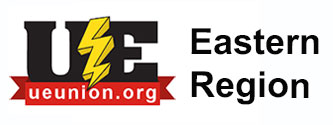“UE” is the abbreviation for United Electrical, Radio and Machine Workers of America, a democratic national union representing some 35,000 workers in a wide variety of manufacturing, public sector and private service-sector jobs. UE is an independent union (not affiliated with the AFL-CIO) proud of its democratic structure and progressive policies.
UE Eastern Region represents 45 locals in 14 states and the District of Columbia, from New Hampshire to Vermont, Pennsylvania, West Virginia, and North Carolina. We support our members in the fight for equality and fair policies.
Our Goals
Improving and strengthening our membership through:
- providing trainings
- sharing experiences
- involving in activities
- developing skills
- offering resources
Expanding our leadership base through:
- leading or co-leading training programs
- E-board and officer development
- planning political events
- organizing work/solidarity support
The Role of Regional Councils
Currently the National UE is made up of geographical regions covering the entire United States, as outlined in the constitution of our organization. UE Eastern Region represents the geographical area of New Hampshire, Vermont, Connecticut, Massachusetts, New York, Pennsylvania, New Jersey, Maryland, Virginia, West Virginia, and North Carolina. While the number of Regions and their geographic boundaries have changed from time to time (reflecting shifts in union membership and the location of locals), the function of the Regions has not changed since the beginnings of our union. What follows is a description of the role and function of the Region in our Union.
The Work of the Regions
UE Regions — officially known as Regional Councils — work with and provide help to locals in each region, especially in the areas of political action, education and leadership training, organizing the unorganized, and collective bargaining. Because these issues affect all locals, Regions serve as important links in maintaining the structure of UE.
The Creation and Work of the Sub-Regions
A new component to the Union’s Regional structure is the creation of geographic sub-regions within each Region to focus on the task of building stronger locals. This is done through developing a structure and forum to provide opportunities to encourage and develop the next generation of UE leaders and activists for our labor movement.
In April 2006, the Eastern Regional Council established sub-regions in the geographic areas to hold periodic one-day meetings with the purpose of advancing the Union’s goals, further developing rank-and-file leadership, and encouraging membership involvement.
Each sub-region shall meet at least one time annually. The agenda for the meetings shall be developed with sessions aimed at promoting mutual aid and support through education, political action, organizing or other activity.
Meetings of the sub-regions shall be coordinated and chaired by the regional president. The sub-regions are not policy-making bodies and as such shall have no elected officers or delegates. The sub-regional meetings shall be open to any member in good standing of the Eastern Region or the sub-region.
Regional Council Meetings
The Council itself consists of elected delegates from every local in the Region, meeting twice a year. Each local is encouraged to send their full complement, because here is where members can broaden their role in, and understanding about, UE. It’s at the Regional Council meeting that local members and officers get to know each other, share experiences, and learn new strategies and tactics.
At Regional Council Meetings
Delegates hear news from all around the union. Locals report on their activities, while presentations by the UE Political Action and Education Departments inform members about important issues. A National Union officer (either the General President, Secretary-Treasurer or Director of Organization) attends the entire meeting to hear members’ concerns and provide updates on the National Union’s programs and activities. There’s plenty of socializing time, too. In short, Regional Council meetings are fun, educational gatherings.
Election of Regional Officers
The Regional Officers, Executive Board and Trustees are elected at the Spring Regional Council meeting. Any UE member in the Region, in good standing, is eligible to run for office. The president and financial secretary, along with four other executive board members (this number varies for the other two regions), elected at this meeting, serve on the National Union’s General Executive Board. Each Regional President also serves as a General Vice President of the National Union.
Funding the Regions
Each UE Local contributes a monthly per capita payment to the Region from its dues money. The per capita amount is set by a vote of the Regional Council delegates and then must be ratified by a majority of the locals to take effect.
This structure means Regions are financed directly by their members, not the National Union. This is an important distinction, because Regional officers are made directly responsible to the members who elected them and who finance the Region. In many other unions, Regional officers are funded by their national union — which can sharply limit accountability to the membership.
UE’s bottom-up structure is evident in how Regions are funded by their locals, not the National Union. This keeps UE Regional Officers responsible to their members.
